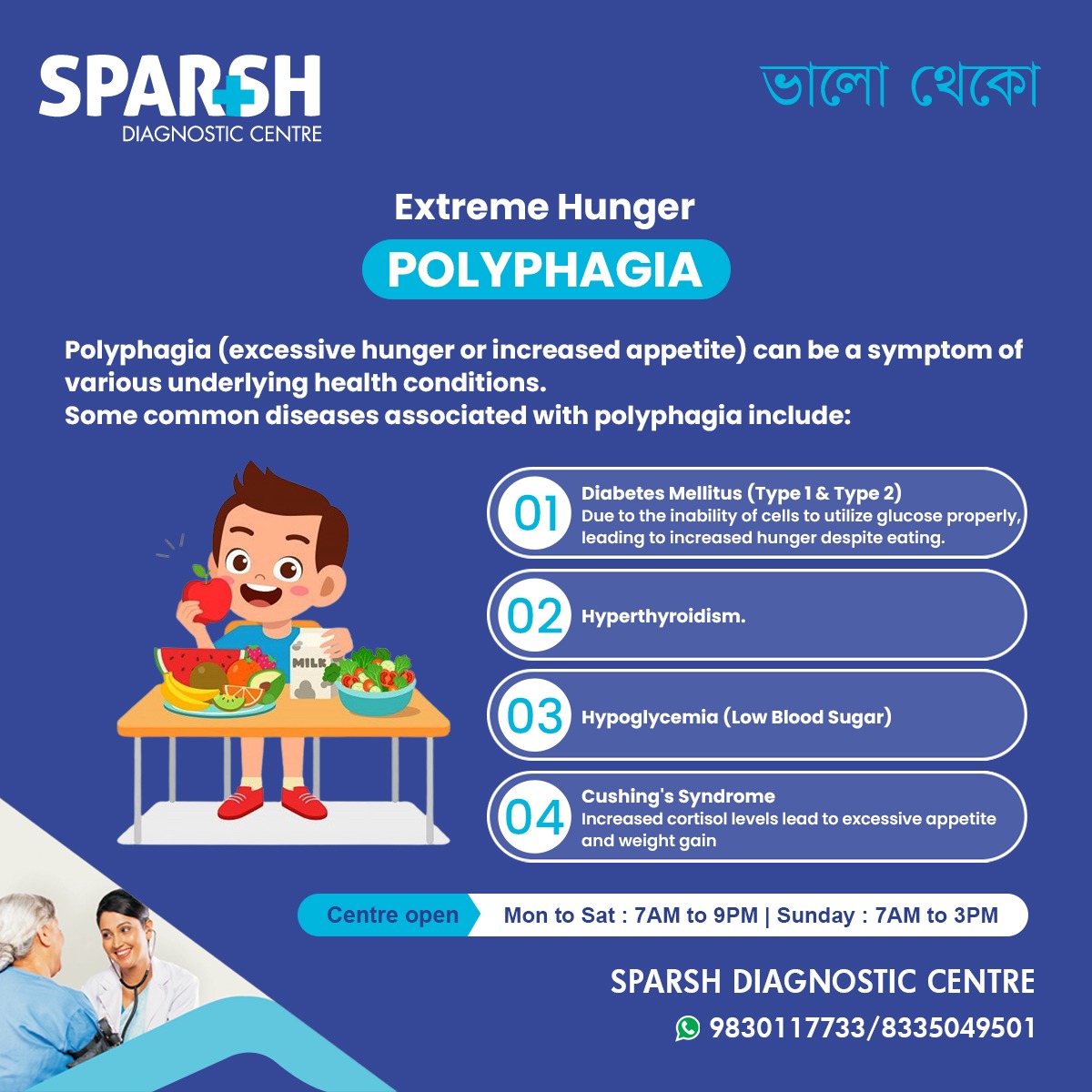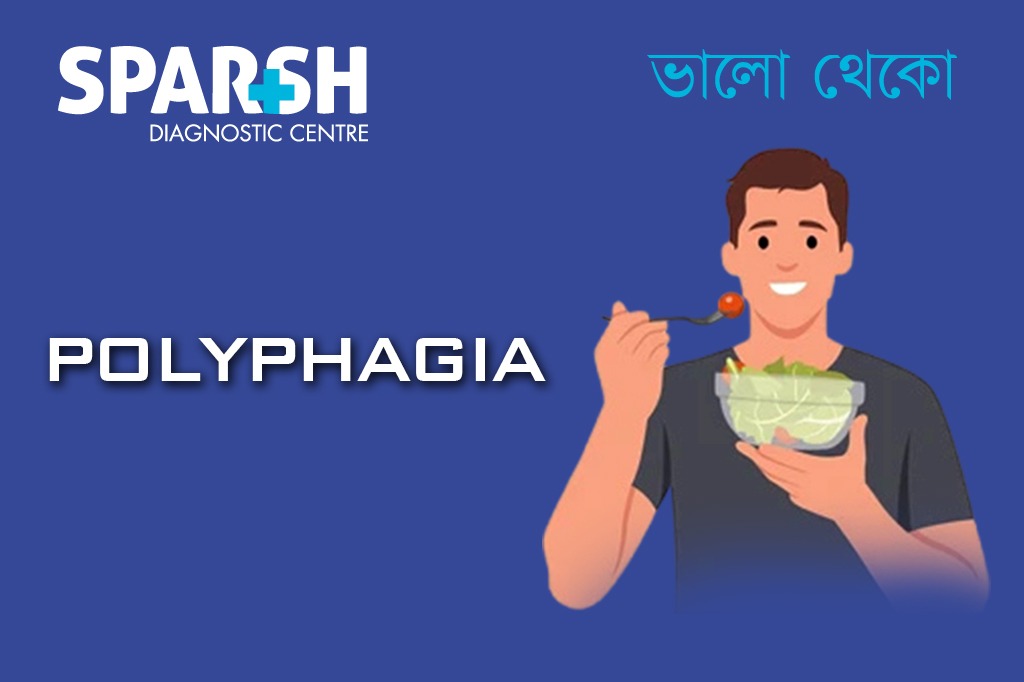Polyphagia—also known as hyperphagia—is the medical term for excessive hunger or increased appetite. While occasional hunger is normal, persistent and intense cravings for food may indicate a deeper health concern. This blog explores the causes, symptoms, diagnosis, and treatment of polyphagia, helping readers understand when to seek medical attention and how to manage this condition effectively.
What Is Polyphagia?
Polyphagia is not a disease in itself but a symptom of various medical conditions. It is characterized by an abnormally increased appetite, often without satisfaction even after eating. Unlike normal hunger, polyphagia persists and may lead to overeating, weight gain, and emotional distress.

Common Causes of Polyphagia
It can stem from physiological, psychological, or hormonal imbalances. Here are the most common causes:
1. Diabetes Mellitus (Type 1 & Type 2)
- In diabetes, the body fails to utilize glucose properly.
- Cells remain starved for energy, triggering constant hunger.
- Polyphagia is one of the “three Ps” of diabetes: polyuria, polydipsia, and polyphagia.
2. Hypoglycemia (Low Blood Sugar)
- A sudden drop in blood sugar levels can cause intense hunger.
- Often seen in diabetic patients due to insulin imbalance.
3. Hyperthyroidism
- Overactive thyroid increases metabolism, leading to rapid calorie burning.
- The body compensates by increasing appetite.
4. Cushing’s Syndrome
- Excess cortisol levels stimulate appetite and fat accumulation.
- Patients often experience weight gain and cravings.
5. Mental Health Disorders
- Conditions like atypical depression, anxiety, and bulimia can trigger emotional eating.
- Food may be used as a coping mechanism.
6. Medications
- Certain drugs like antipsychotics, corticosteroids, and antidepressants may increase appetite as a side effect.
Symptoms of Polyphagia
Recognizing the condition involves observing behavioral and physical signs:
- Persistent hunger even after meals
- Frequent snacking or binge eating
- Weight gain or obesity
- Irritability when food is delayed
- Cravings for high-calorie or sugary foods
- Fatigue despite eating adequately
Diagnosis: How is Polyphagia identified?
Diagnosis begins with a clinical evaluation and may include:
- Medical history review: To identify underlying conditions like diabetes or thyroid disorders
- Blood tests: To check glucose levels, thyroid function, and cortisol levels
- Psychological assessment: If emotional or behavioral factors are suspected
- Dietary analysis: To understand eating patterns and nutritional intake
Treatment & Management of Polyphagia
Effective treatment depends on the underlying cause. Here are key strategies:
1. Managing Diabetes
- Insulin therapy or oral hypoglycemics
- Blood sugar monitoring
- Low-glycemic diet and regular exercise
2. Thyroid Regulation
- Antithyroid medications or radioactive iodine therapy
- Regular thyroid function tests
3. Hormonal Therapy
- For conditions like Cushing’s syndrome, treatment may include surgery or medications to reduce cortisol levels
4. Mental Health Support
- Cognitive Behavioral Therapy (CBT)
- Stress management techniques
- Psychiatric medications if needed
5. Lifestyle Modifications
- Balanced meals with fiber and protein
- Avoiding processed sugars and refined carbs
- Mindful eating practices
- Regular physical activity
Polyphagia vs. Normal Hunger
| Feature | Normal Hunger | Polyphagia |
|---|---|---|
| Frequency | Occasional | Persistent and frequent |
| Satisfaction after eating | Yes | No |
| Associated conditions | None or mild fatigue | Diabetes, thyroid issues, etc. |
| Emotional triggers | Rare | Common (stress, anxiety) |
Frequently Asked Questions (FAQs)
Q1. Is it a disease?
No. Polyphagia is a symptom, not a standalone disease. It often indicates an underlying health issue like diabetes or hyperthyroidism.
Q2. Can children have polyphagia?
Yes. Children with Type 1 diabetes or hormonal imbalances may exhibit signs of polyphagia. A pediatric evaluation is essential.
Q3. How is it different from binge eating?
Polyphagia is driven by physiological hunger, while binge eating is often emotional or psychological, involving loss of control.
Q4. Can it be cured?
If the underlying cause is treated, polyphagia can be managed or resolved. Lifestyle changes and medical therapy are key.
Q5. Should I see a doctor for excessive hunger?
Yes. If hunger is persistent, disruptive, or accompanied by other symptoms like weight gain or fatigue, consult a healthcare provider.
Polyphagia is more than just feeling hungry—it’s a clinical symptom that deserves attention. Whether it’s diabetes, thyroid dysfunction, or emotional distress, understanding the root cause is essential for effective management. If you or someone you know is experiencing unusual hunger patterns, don’t ignore it. Early diagnosis and treatment can make a significant difference.
#BhaloTheko
Disclaimer:
No content on this site, regardless of date, should ever be used as a substitute for direct medical advice from your doctor or other qualified clinician.

![]()





